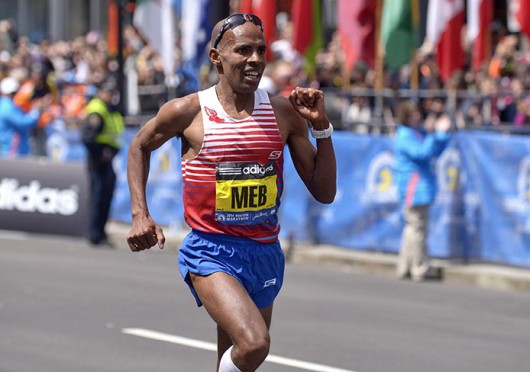
Meb Keflezighi wins the 118th Boston Marathon, a year after deadly bombings, near the Marathon finish line in Boston April 21. Keflezighi is the first American male to win since 1983.
Credit: Courtesy of MCT
For one Ohio State student, “Boston Strong” is more than a slogan.
“The T-shirts and the posters and whatnot that say ‘Boston Strong’ on them, to a lot of people those are just the memorial slogan for what occurred, but for us it’s a sign of how close Boston is as a city,” said Taylor Landes, a fourth-year in international studies who is from Boston.
A year ago, Landes said she knew Boston was a strong city, but after being about the length of a football field away from blasts at the finish line of the 117th Boston Marathon, she said that mindset was only strengthened.
“Boston has always been a strong community. It’s a small city for being such a major city,” Landes said. “Everyone always jokes about how the sports fans are so crazy and so tight, and so it was a tight city anyways, a strong community. But especially after the bombing, if it was even possible, Boston just became even closer.”
On April 15, 2013, two men set off two bombs at the finish line of the Boston Marathon. Three were killed, more than 260 were injured. A year later, nothing stopped Boston from running again Monday as 35,456 runners hit the streets Monday.
Carley Tanchon, a student assistant in OSU’s neurosurgery department, was among the 23,000 runners in the Boston Marathon last year, and plans to run the race again next year.
“Boston is an extremely emotional race to begin with,” Tanchon said. “When I ran it last year, I almost started crying in the first mile, just acknowledging that you’re a part of such a historic event.
“The Boston Marathon has had, it just has been such a monument in the running community for decades. And you’re aware of that, you feel that when you’re on the course. I felt that the whole time I was running, and I didn’t even know what went on.”
She said that day last April reminded her why running, and the community surrounding the sport, is so important to her.
“It’s that reminder that you run, because of your connection to people more than anything else,” she said. “And sure, it’s great to work hard and run a good time, that’s what we all strive for as well, but at the end of the day, it’s about people.”
Tanchon ran the race with her father, and said they left the finish line about five minutes before the first blast went off.
“When I was at the finish line, the sun was shining, we were so excited and we were ready to go back to the hotel … and so then to get off (the train) and hear that that had happened, and then watching the video, and then all you see at the finish line is dust and smoke,” she said. “And it was honestly so surreal because my last image, which was less than five minutes ago, five minutes before that happened, was just all fun.”
She said she was glad she didn’t have a more detailed personal story about what unfolded at the finish line.
“It just reminds you in general how quickly things can change,” Tanchon said. “I’m sure people who asked me about it initially were hoping that I had some kind of crazy story to share about it, and I didn’t. And I’m so grateful that the extent of my crazy story is that by God’s grace, I ended up being out of that area within five minutes of it happening.”
Landes said she was proud of the other stories that crossed the finish line — ones of hope.
“Just from the day itself, having so many people just rush to help others, more people rushed to help others than ran away from the scene,” she said. “So many people opened their doors to strangers in order to provide shelter and food for them while people were trying to figure out what was going on, and the panic of the day. And just as the year’s gone on, there’s definitely just a sense of humanity.”
She said aside from that sense of humanity, being so close to the finish line when the bombs went off taught her about strength.
“It taught me to really push through trying times,” she said. “The way I look at it is if I can push through taking finals after something like that, then I can kind of handle anything.”
Landes said in the aftermath of the bombing, she was thankful for the support provided to her at OSU. She said people constantly reached out to her to make sure she wasn’t lonely.
“I left Boston, so I felt like I was leaving my home, and Ohio State made it a lot easier to kind of cope with the fact,” Landes said. “The Ohio State community proved it is one of the strongest college communities in the country.”


